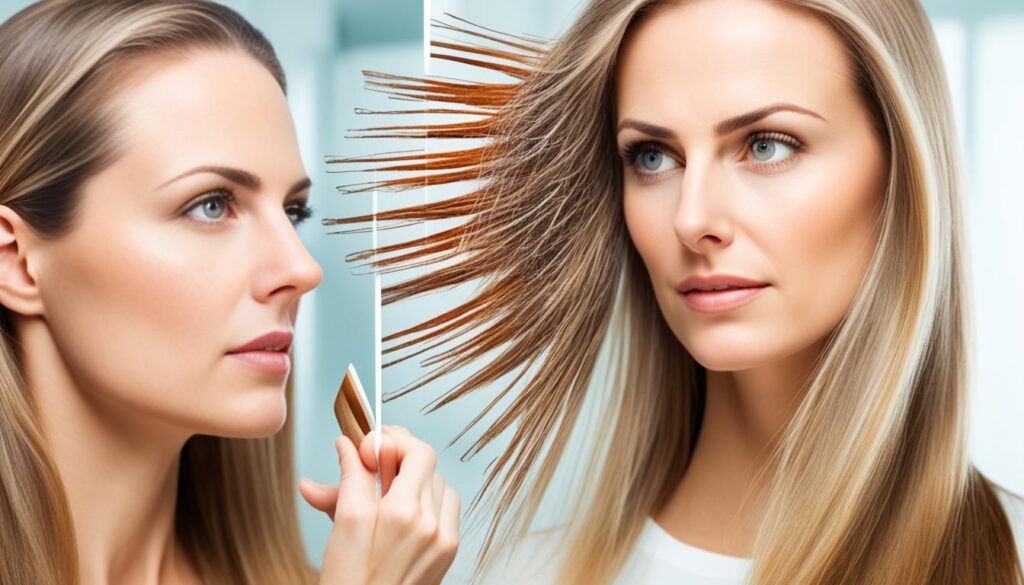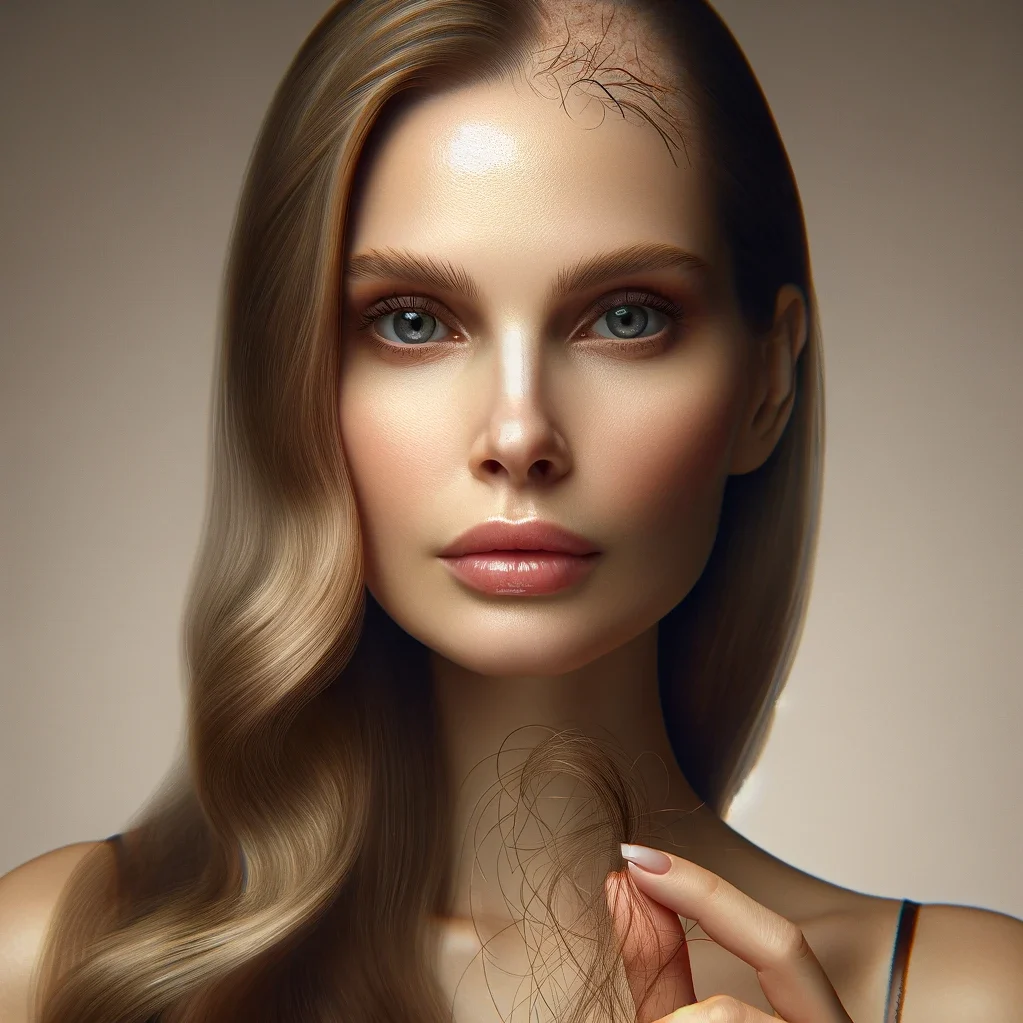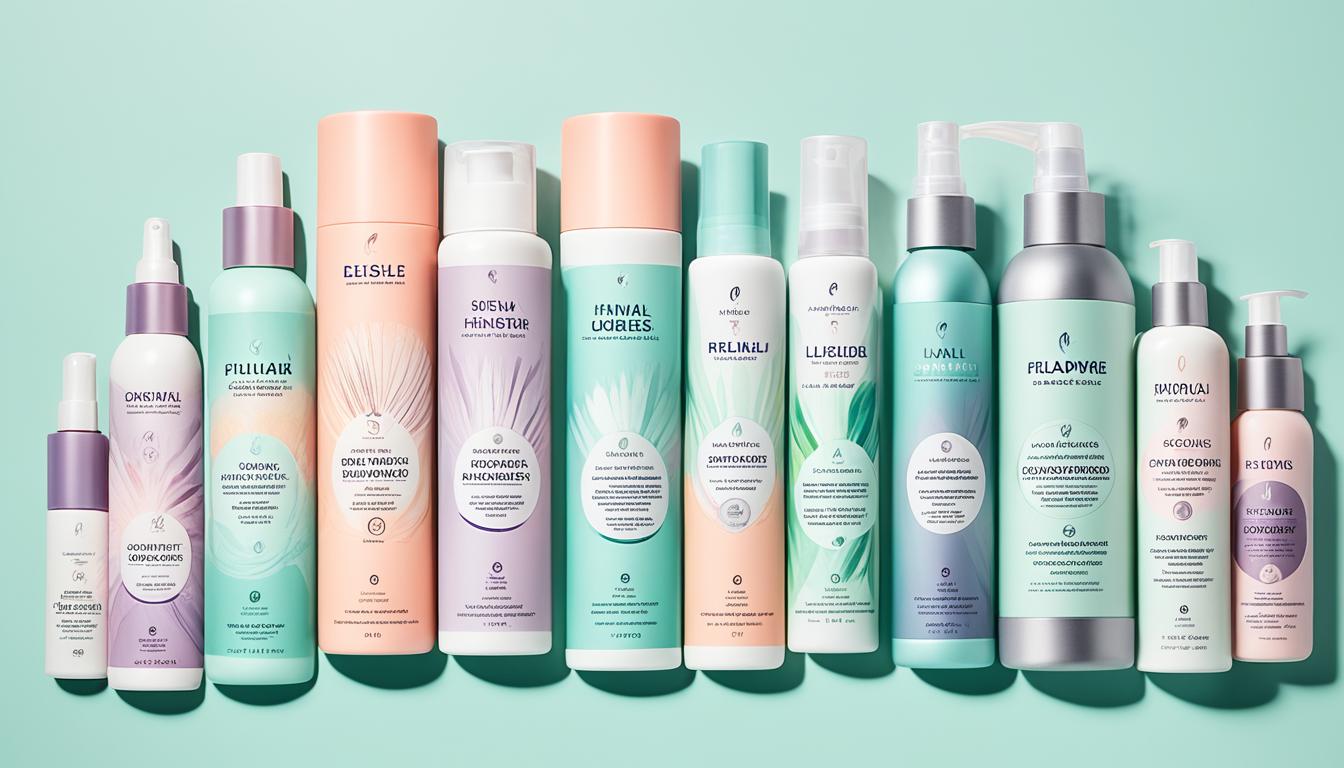Hair loss is a common concern for many women, but rest assured, there are effective products available to prevent and combat this issue. We understand the frustration and emotional impact that hair loss can have, which is why we have researched and compiled a list of the best hair loss prevention products for women, recommended by dermatologists and experts in the field. Whether you’re looking to strengthen, protect, or regrow your hair, these products have been proven to deliver results.
Key Takeaways:
- Women’s hair loss prevention is a common concern that can be addressed with the right products.
- Consulting a dermatologist is advisable, especially if there is a family history of hair loss or noticeable thinning.
- A healthy lifestyle and balanced diet can promote overall hair health.
- Topical solutions, serums, shampoos, oils, supplements, and oral medications are effective options for hair growth and prevention.
- Early intervention is crucial in managing hair loss and achieving desirable results.
Understanding Hair Loss in Women
Hair loss in women can be a distressing experience, but understanding the underlying causes is crucial to finding effective solutions. Various factors contribute to hair loss in women, including genetics, hormones, stress, and nutrition. By understanding the root causes, we can make informed decisions in addressing and preventing hair loss.
One common cause of hair thinning in women is hair miniaturization. This occurs when the hair follicles shrink and produce thinner hairs over time. Genetic factors play a significant role in this process, with certain individuals being more predisposed to hair miniaturization.
Hormonal factors also contribute to hair loss in women. Fluctuations in hormone levels, such as those experienced during pregnancy, menopause, or with hormonal disorders, can lead to hair thinning and shedding. Hormones like dihydrotestosterone (DHT) can also contribute to hair loss by shrinking hair follicles and shortening the hair growth cycle.

Stress and nutrition are additional factors that can affect hair health. High stress levels can disrupt the normal hair growth cycle, leading to increased shedding. Additionally, inadequate nutrition, particularly a deficiency in essential vitamins and minerals, can weaken hair strands and contribute to hair loss.
It’s important to differentiate between temporary hair shedding and more severe hair loss conditions. Temporary shedding, often experienced after stressful events or major hormonal changes, is usually temporary and the hair should naturally regain its normal thickness over time. On the other hand, balding is characterized by significant hair loss from the scalp, accompanied by a halt in new hair growth.
By understanding the different causes of hair loss in women, we can select appropriate prevention products and treatments to address the specific underlying factors. Whether it’s genetics, hormones, stress, or nutrition, a comprehensive approach tailored to individual needs can help restore, maintain, and promote healthier hair.
Tips for Hair Loss Prevention
Preventing hair loss in women requires adopting certain measures and making lifestyle changes to promote healthy hair growth. Below are some tips that can help prevent hair loss:
1. Consult a Dermatologist
If you are experiencing hair loss or notice thinning hair, consulting a board-certified dermatologist is essential. They can evaluate your condition, identify the underlying cause, and recommend appropriate treatment options. This is particularly important if you have a family history of hair loss or if the thinning is significant in the early stages.
2. Maintain a Healthy Lifestyle
A balanced diet plays a crucial role in maintaining healthy hair. Include foods that are rich in proteins, such as lean meats, fish, eggs, and legumes. Incorporate leafy greens and fruits, which provide essential vitamins and minerals for hair health. Healthy fats like avocados, nuts, and seeds also contribute to the overall well-being of your hair. Drinking an adequate amount of water and avoiding excessive alcohol and caffeine intake are also important for maintaining hair health.
3. Minimize Hair Damage
Avoid heavy hair processing treatments like chemical relaxers, bleaching, and excessive heat styling, as they can damage the hair shaft and lead to breakage. Opt for gentle hair care practices and use heat protectants when styling with hot tools. Avoid tight hairstyles, as they can pull on the hair and cause traction alopecia over time.
4. Protect Your Scalp
Protecting your scalp is crucial for maintaining healthy hair. Use a wide-brimmed hat or sunscreen when exposed to the sun for extended periods to prevent scalp burns. Minimize direct exposure to harsh weather conditions, as extreme heat, cold, and wind can potentially damage your hair.
5. Manage Stress
Stress can contribute to hair loss, so it’s important to manage it effectively. Engage in stress-reducing activities such as exercise, yoga, meditation, and deep breathing exercises. Getting enough sleep and practicing good sleep hygiene can also help reduce stress and promote better hair health.
By following these tips and incorporating them into your daily routine, you can effectively prevent hair loss and maintain healthy hair. However, if you continue to experience significant hair loss or have concerns, consult with a dermatologist for personalized guidance and treatment options.

Hair Loss Prevention Measures
| Prevention Measures | Description |
|---|---|
| Consult a Dermatologist | Seek professional advice from a board-certified dermatologist for accurate diagnosis and personalized treatment. |
| Maintain a Healthy Diet | Consume foods rich in proteins, leafy greens, and healthy fats to nourish your hair from within. |
| Minimize Hair Damage | Avoid chemical treatments and excessive heat styling to prevent hair breakage and damage. |
| Protect Your Scalp | Shield your scalp from sunburn and harsh weather conditions to maintain optimal hair health. |
| Manage Stress | Adopt stress-reducing techniques like exercise, meditation, and adequate sleep to minimize hair loss caused by stress. |
Topical Solutions and Serums for Hair Growth
When it comes to promoting hair growth, topical solutions and serums are highly effective. These products are specifically designed to nourish the scalp, strengthen the hair follicles, and stimulate regrowth. Here are some key ingredients and natural oils commonly found in these solutions:
- Minoxidil: Minoxidil is an FDA-approved ingredient that has been proven to increase blood flow to the scalp, rejuvenating hair follicles and promoting hair regrowth.
- Peptides: Peptides are known for their ability to improve hair density and thickness, providing a boost of volume and fullness.
- Caffeine: Caffeine stimulates blood circulation in the scalp, promoting hair follicle health and encouraging hair growth.
- Keratin: Keratin is a protein that strengthens the hair shaft, reducing breakage and ensuring healthier, more resilient hair.
- Biotin: Biotin is a B-vitamin that supports hair growth by nourishing the hair follicles and promoting the production of keratin.
In addition to these key ingredients, topical solutions and serums often contain a variety of natural oils that provide added benefits:
- Rosemary oil: Rosemary oil stimulates hair follicles, improves circulation, and helps prevent hair loss.
- Castor oil: Castor oil is known for its moisturizing properties and high concentration of ricinoleic acid, which stimulates hair growth.
- Coconut oil: Coconut oil nourishes the scalp, locks in moisture, and reduces protein loss from the hair, leading to healthier, stronger strands.
- Argan oil: Argan oil is rich in antioxidants and essential fatty acids that promote scalp health and nourish the hair follicles.
- Olive oil: Olive oil moisturizes the scalp, reduces inflammation, and helps prevent hair breakage.
By incorporating these topical solutions and serums into your hair care routine, you can provide your scalp with the nourishment it needs to promote healthy hair growth. However, it’s important to consult a dermatologist or hair care professional before introducing any new products into your routine to ensure they are suitable for your specific needs and hair type.
Thickening Shampoos for Fuller Hair
When it comes to achieving fuller-looking hair, thickening shampoos are a valuable tool in your hair care routine. These innovative products are specially formulated with ingredients that help increase the diameter of your hair strands, giving the appearance of thicker and denser hair.
One key component often found in thickening shampoos is ketoconazole, which not only helps combat dandruff but also contributes to the overall health of the scalp. By maintaining a healthy scalp, ketoconazole promotes an ideal environment for hair growth, allowing your hair to reach its full potential.
Another essential ingredient in thickening shampoos is niacinamide. This powerful nutrient helps maintain the natural moisture barrier of the scalp, preventing excessive dryness while promoting a healthier scalp environment. With a healthier scalp, your hair follicles can thrive, resulting in stronger and more voluminous hair.
Additionally, for those experiencing hair loss, using a shampoo and conditioner specifically formulated for hair loss can provide added benefits. These products often contain ingredients that nourish the scalp, strengthen the hair follicles, and improve hair retention, helping to combat and prevent further hair loss.
When incorporating thickening shampoos into your hair care routine, it is important to follow the instructions provided and be consistent with usage for optimal results. Remember that it may take time to see noticeable improvements, as hair growth is a gradual process.
With the right thickening shampoo, you can achieve the appearance of fuller hair and enjoy the confidence that comes with it. Invest in a high-quality thickening shampoo and start your journey to fuller-looking hair today.
Nourishing Hair Oils for Growth
Hair oils have gained popularity for their ability to promote hair growth and nourish the scalp. These oils contain natural ingredients that provide numerous benefits for hair health. One such ingredient is castor oil, which is rich in ricinoleic acid. This essential fatty acid helps boost circulation, strengthen hair strands, and stimulate growth.
Alongside castor oil, there are other nutrient-rich oils that offer hydration, nourishment, and protection to the hair and scalp. Rosemary oil has been shown to improve blood circulation in the scalp, promoting hair growth and strengthening the hair follicles. Coconut oil is known for its moisturizing properties, while argan oil provides essential fatty acids and vitamins to nourish the scalp and improve hair strength.
Another beneficial oil is olive oil, which contains antioxidants and moisturizing properties that can hydrate the hair and scalp, preventing dryness and promoting healthy growth. These natural ingredients work synergistically to enhance the effectiveness of hair growth products and provide optimal nourishment for the scalp.
To truly understand the benefits of these nourishing oils, let’s take a closer look at their properties:
Castor Oil:
- Rich in ricinoleic acid, which boosts circulation and strengthens hair
Rosemary Oil:
- Improves blood circulation in the scalp
- Promotes hair growth and strengthens hair follicles
Coconut Oil:
- Moisturizes the hair and scalp
Argan Oil:
- Provides essential fatty acids and vitamins for nourishment
- Improves hair strength
Olive Oil:
- Contains antioxidants and moisturizing properties
- Hydrates the hair and scalp, preventing dryness
By incorporating these nourishing oils into your hair care routine, you can provide the essential nutrients and hydration needed for healthy hair growth. Whether as standalone oils or formulated into hair growth products, these natural ingredients have proven benefits for achieving luscious, vibrant hair.
| Hair Oil | Main Benefits |
|---|---|
| Castor Oil | Boosts circulation and strengthens hair |
| Rosemary Oil | Improves blood circulation, promotes hair growth, and strengthens hair follicles |
| Coconut Oil | Moisturizes the hair and scalp |
| Argan Oil | Provides essential fatty acids and vitamins for nourishment, improves hair strength |
| Olive Oil | Contains antioxidants and moisturizing properties, hydrates the hair and scalp |
Supplement and Oral Medication Options
In addition to topical solutions and shampoos, incorporating supplements and oral medications into your hair care routine can further aid in promoting hair growth and preventing further loss. These options provide a more comprehensive approach to addressing the underlying causes of hair loss and stimulating healthy hair regrowth.
Supplements for Hair Growth
Nutritional supplements play a crucial role in supporting hair health and growth. Here are some commonly recommended supplements:
- Biotin: Biotin, also known as vitamin H, is a B-complex vitamin that helps promote hair cell production and strengthen hair follicles. It is often included in hair growth supplements.
- Collagen: Collagen is a protein that contributes to the structural integrity of hair. Supplementing with collagen can improve hair strength and overall hair health.
- Vitamins: Essential vitamins like vitamin A, vitamin E, and vitamin D play a vital role in promoting hair growth. They help nourish the scalp, support hair follicle function, and improve overall hair health.
When considering supplements, it is recommended to consult with a healthcare professional or dermatologist to determine the appropriate dosage and combination for your specific needs.
Oral Medications for Hair Loss
In cases of more severe hair loss, oral medications may be prescribed by a healthcare professional. These medications help address underlying hormonal imbalances and promote hair regrowth. Some common oral medications for hair loss include:
- Finasteride: Finasteride is an FDA-approved medication that inhibits the production of a hormone called dihydrotestosterone (DHT), which is known to contribute to hair loss. It is primarily used to treat male pattern baldness but may also be prescribed for women with androgenetic alopecia.
- Minoxidil: Minoxidil is a topical medication that can be used by both men and women to promote hair growth. When applied to the scalp, it widens blood vessels, increases blood flow, and stimulates hair follicles, resulting in new hair growth.
- Spironolactone: Spironolactone is a medication primarily used to treat hypertension but has also been found to help with hair loss in women. It works by blocking the effects of androgen hormones that contribute to hair thinning and pattern baldness.
It is important to note that these medications should be taken under the guidance and supervision of a healthcare professional, as they may have potential side effects and require regular monitoring.
Treatments for Immune-Mediated Hair Loss
For individuals experiencing immune-mediated hair loss, such as alopecia areata, additional treatment options may be recommended by a dermatologist. These treatments aim to modulate the immune system and promote hair regrowth. Some options include:
- Janus Kinase (JAK) Inhibitors: JAK inhibitors are a newer class of medications that target specific enzymes in the immune system, helping to suppress the inflammatory response responsible for hair loss. They have shown promising results in the treatment of alopecia areata.
- Steroid Injections: Steroid injections can be administered directly into the scalp to reduce inflammation and stimulate hair regrowth. This treatment is often used for localized areas of hair loss.
It is crucial to consult with a dermatologist who specializes in hair loss to determine the most suitable treatment approach for your specific condition.
Conclusion
In conclusion, hair loss prevention is a common concern among many women, but there are numerous products available to address this issue. Whether it’s topical solutions, shampoos, nourishing oils, supplements, or oral medications, there are multiple options to promote hair growth and prevent further loss.
Early intervention plays a crucial role in effectively managing hair loss. Consulting a board-certified dermatologist and incorporating these products and preventative measures into a hair care routine can make a significant difference. By taking proactive steps, women can strengthen, protect, and regrow their hair with confidence and grace.
With the wide range of proven hair loss prevention products and the importance of early intervention, women no longer have to feel helpless in the face of hair loss. By exploring the variety of options available and seeking professional advice, women can address this concern and take control of their hair health.
FAQ
What causes hair loss in women?
Hair loss in women can be caused by various factors including genetics, hormones, stress, and nutrition.
How can I prevent hair loss?
To prevent hair loss, it is advisable to consult a dermatologist, maintain a healthy lifestyle, and avoid heavy processing and tight styling of the hair.
What are topical solutions and serums for hair growth?
Topical solutions and serums, such as minoxidil, peptides, caffeine, and various oils, are effective options for promoting hair growth and strengthening the hair.
How do thickening shampoos work?
Thickening shampoos increase the diameter of hair strands, creating the appearance of fuller hair. They often contain ingredients like ketoconazole and niacinamide.
What are the benefits of hair oils?
Hair oils, such as castor oil, rosemary oil, coconut oil, argan oil, and olive oil, provide hydration, nourishment, and protection to the hair and scalp, promoting hair growth.
Are there supplements or oral medications for hair growth?
Yes, there are supplements like biotin and vitamins, as well as medications like finasteride, minoxidil, and spironolactone, that can support hair growth. Treatment options for immune-mediated hair loss may also be available.

